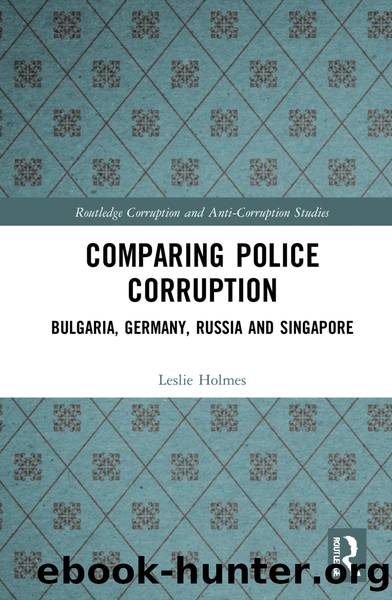Comparing Police Corruption: Bulgaria, Germany, Russia and Singapore by Leslie Holmes

Author:Leslie Holmes [Holmes, Leslie]
Language: eng
Format: epub
ISBN: 9780367742706
Google: pkZozgEACAAJ
Goodreads: 57932722
Publisher: Routledge
Published: 2021-09-30T00:00:00+00:00
Game theories
Game theories are formal and based on the assumption that actors mostly behave rationally and make decisions based on logic. The approach can be traced back to an article by John von Neumann published in 1928, though the first full-length elaboration was a book originally published by von Neumann and Oskar Morgenstern in 1944. An early example of game theory is zero-sum games â one personâs gain is another personâs loss. But whereas standard RCT need not involve more than one person, game theory is necessarily interactive between two or more âplayersâ. In the words of Florian Diekert (2012: 1776), game theory is âthe study of rational choice in interactive decision problemsâ. Two of the best-known âgamesâ in game theory are the prisonerâs dilemma (originally two players, though this has since been expanded: the term was coined by mathematician Albert W. Tucker in the early 1950s â Tucker 1951),4 following the 1950 exposition of the game by Merrill Flood and Melvin Drescher (MérÅ 1998: 28: see too Axelrod 1980, 1981; Poundstone 1992) and the tragedy of the commons (multiple players â for details see Hardin 1967; Diekert 2012).
Game theories are seen by some (e.g. Colman 2003) as an advance on RCT, since they are said to allow for âcommon senseâ or common knowledge as well as pure rationality. Others (e.g. Schelling 1960) are more critical of classical game theories for numerous reasons, including internal incoherence (Sensat 1997: 380), their unrealistic assumptions about both rationality and the amount of knowledge actors have, and for oversimplifying the complexity of the human mind (Sadedin 2015). Another major criticism is that they are too abstract â the world, as well as the human mind, is messier and less logical than they imply.
Nevertheless, game theory has been used to explain corruption in various contexts (e.g. Macrae 1982; Friehe 2008; Ãbeda and Duéñez-Guzmán 2011). Suzanne Sadedin (2015) has applied it specifically to police corruption. For her, a game is âa stylised scenario in which each player receives a pay-off determined by the strategies chosen by all playersâ. She provides a neat explanation of the prisonerâs dilemma and shows how, in that game, the maxim âalways act like an untrusting jerkâ is the most reliable strategy. However, she also shows how there are many examples from nature â including the most frequent form of human behaviour â that reveal that âbiological nicenessâ (i.e. an innate tendency to help or cooperate with others) is more common than the individualâs continuous pursuit of self-interest. She also refers to the work of Francisco Ãbeda and Edgar Duéñez-Guzmán (2011) whose game-theoretical approach reaches depressing conclusions on the possibilities of reducing corruption among those meant to police society. She decided to collaborate with one of the authors (Duéñez-Guzmán) to see if there was any possibility of a more encouraging scenario. They did find one â but it is one that is, sadly, unrealistic: their solution was to abandon the distinction between the police and the public, and make everybody responsible for policing.
Download
This site does not store any files on its server. We only index and link to content provided by other sites. Please contact the content providers to delete copyright contents if any and email us, we'll remove relevant links or contents immediately.
The Secret History by Donna Tartt(19052)
The Social Justice Warrior Handbook by Lisa De Pasquale(12187)
Thirteen Reasons Why by Jay Asher(8893)
This Is How You Lose Her by Junot Diaz(6877)
Weapons of Math Destruction by Cathy O'Neil(6264)
Zero to One by Peter Thiel(5786)
Beartown by Fredrik Backman(5737)
The Myth of the Strong Leader by Archie Brown(5499)
The Fire Next Time by James Baldwin(5431)
How Democracies Die by Steven Levitsky & Daniel Ziblatt(5215)
Promise Me, Dad by Joe Biden(5141)
Stone's Rules by Roger Stone(5081)
A Higher Loyalty: Truth, Lies, and Leadership by James Comey(4954)
100 Deadly Skills by Clint Emerson(4921)
Rise and Kill First by Ronen Bergman(4779)
Secrecy World by Jake Bernstein(4741)
The David Icke Guide to the Global Conspiracy (and how to end it) by David Icke(4706)
The Farm by Tom Rob Smith(4502)
The Doomsday Machine by Daniel Ellsberg(4484)
